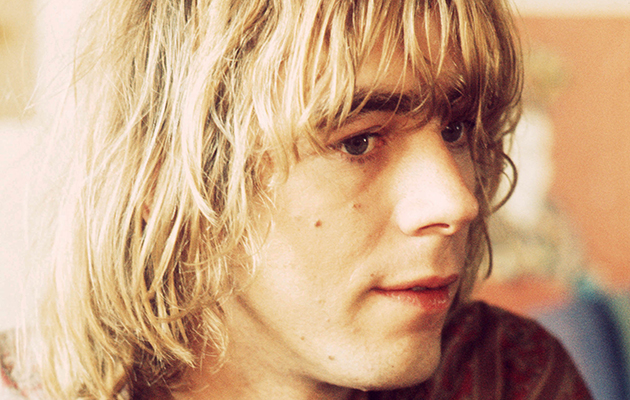Subscribe to Uncut and make huge savings on the cover price – find out by clicking here!
Originally published in Uncut’s May 2013 issue (Take 192)
His drummers needed to make him laugh. His manager needed to keep hold of the corkscrew. Yet somehow, in the early ’70s, Kevin Ayers made four extraordinary solo albums. Robert Wyatt, Mike Oldfield and those long-suffering managers remember the beautiful, lazy boy with an “amazing melodic gift”…
___________________________
Even with The Whole World on stage with him, it’s Kevin Ayers everyone’s looking at, the crowd’s unanimous gaze turned towards him, entranced. There’s something almost liquid about him, as if he’s been poured into his own body. He’s not dressed up, or anything. There’s no cape, cat-suit, kimono or neo-Kabuki clobber, just a scooped-neck T-shirt with long sleeves and the kind of bellbottoms you might see on a sailor, a gigolo deckhand, fresh from a shift in the happy Adriatic, a girl in every port still warm from his recent touch.
Then there’s his voice, that suave baritone, a crooner’s voice, dark and seductive. It’s the voice of an irresistible charmer, possibly a bit of a cad, a breaker of hearts and promises, dangerously flirtatious. When he briefly speaks between songs, he sounds dreamy and distracted, rather baffled by where he is and what he’s doing, as if he’s arrived here by accident. He has the slightly dissolute air of someone who if they had it all would throw it away, if they could only be bothered, which Kevin looks like he can’t.
It is, by the way, June 19, 1970, and Ayers and his band, The Whole World, are appearing at Cardiff’s Sophia Gardens, on a bill headlined by the very hairy Edgar Broughton Band that also includes winsome folk singer Bridget St John, who often at this time tours with Kevin. In November 1967, I’d seen Hendrix and Pink Floyd in their psychedelic pomp at this venue and neither was as cheerfully weird as The Whole World, who are now essaying something wholly eccentric that will be called “Rheinhardt And Geraldine/Colores Para Dolores” when it turns up later in the year on Shooting At The Moon, second of the four landmark albums Ayers recorded for EMI’s bespoke underground label Harvest between 1969 and 1973.
Tonight, it’s a kind of free-jazz blow-out, with Kevin in the middle of this sonic maelstrom, looking rather bemused by the ferocious racket everyone’s making around him, like a man who’s walked into a room to find everyone in it screaming at each other, bedlam unleashed for reasons clear to no-one. I turn to the girl I’m with to see what she thinks of it all, but she clearly hasn’t been paying much attention to the music and has instead been paddling in the warm lapping waters of Ayers’ oceanic charm. In her now whispered opinion, he’s the sexiest thing she’s ever seen, a comment that might have caused a pulse of jealousy if I hadn’t been thinking exactly the same thing.
“He was such a beautiful boy,” says Robert Wyatt of Kevin Ayers, his friend for nearly 50 years. “The funny thing about people dying, they become alive for me in a way that’s quite extraordinary. Kevin has loomed enormously in my mind the last week or so and it’s been great revisiting him.”
They were teenagers when they met and Wyatt was already in The Wild Flowers, as they were originally called, the first of the bands in what became known as the Canterbury Scene that would subsequently include Soft Machine and Caravan. “I remember being told there was this bloke who lived in Herne Bay, on the north coast of east Kent who had long hair that I should meet, which we did. He was at ease with himself in a way that was unusual at the time. In the early ’60s, it was still the late ’50s, generally speaking, in provincial England and people were often uptight. He was a breath of fresh air in that he was very loose. He read Oscar Wilde. He listened to calypso, Latin American and Central American music. He wasn’t particularly into rock’n’roll. There was no-one else like him. He was already unique.
“He had a guitar and would sing all these funny songs he’d written. And what I realised early on was that he had this amazing melodic gift, that his songs had the naturalness of folk music, songs that have lasted for ages and been honed over the decades. That was striking.
“I was in this little local band in Canterbury, The Wild Flowers, which he joined and immediately stuck an ‘e’ on the end of the name, made it Wilde, like Oscar, and his material was a very welcome addition to our repertoire. To me, what gave us the right, what gave us the nerve to become Soft Machine and do our own stuff was Kevin’s songs. Unfortunately, they got kind of side-lined and torpedoed by the live act we became. We always blasted away instrumentally and marginalised these great songs, and I’ve always felt a little sheepish about that. He was subsequently too modest about his role in Soft Machine, but at the time his ideas were as far out as anybody’s.”
Like us on Facebook or follow us on Twitter to keep up to date with the latest news from Uncut.



